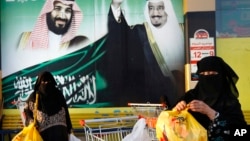Saudi Arabian aid worker Abdulrahman al-Sadhan was sentenced by a counterterrorism court to 20 years in prison followed by a 20-year travel ban. He was reportedly arrested on March 12, 2018, while at the Red Crescent Society offices in the capital Riyadh, where he worked.
The United States is concerned over Sadhan’s sentencing, said State Department spokesperson Ned Price in a statement. “We will continue to monitor this case closely throughout any appeals process. As we have said to Saudi officials at all levels, freedom of expression should never be a punishable offense.”
The aid worker's sister, U.S. citizen Areej al-Sadhan, has been advocating for her brother’s release and said Abdulrahman was detained without a warrant or charges against him until February 2021.
The Biden-Harris administration has taken a tough stance over Saudi Arabia’s human rights record and has urged Riyadh to release political prisoners. According to the latest State Department human rights report on Saudi Arabia, local activists and human rights organizations claimed there were “hundreds” or “thousands” of political prisoners, including detainees who reportedly remained in prolonged detention without charge.
The 2020 human rights report stated that at least 192 persons remained in detention for activism, criticism of government leaders or policies, impugning Islam or religious leaders, or “offensive” internet postings, including prominent activists such as Raif Badawi, Mohammed al-Qahtani, Naimah Abdullah al-Matrod, Maha al-Rafidi, Eman al-Nafjan, Waleed Abu al-Khair, and Nassima al-Sadah, among others.
There has been some progress in 2021. In February, Saudi women's rights advocate Loujain al-Hathloul was released after nearly three years in prison. She is subject to a travel ban. Hathloul, best known for campaigning to legalize driving for women in Saudi Arabia, was detained in May of 2018, along with several other female activists, just weeks before the Saudi government lifted the ban on women driving. In addition, two Saudi activists with U.S. citizenship, Bader al-Ibrahim and Salah al-Haidar, have also been conditionally released pending trials on terrorism-related charges. A third Saudi activist with U.S. citizenship – Dr. Walid Fitaihi – was released with his sentence reduced to time served but continues to face travel and asset bans.
The United States, said spokesperson Price, “will continue to elevate the role of human rights in [its] relationship with Saudi Arabia and encourage legal reforms that respect the human rights of all individuals.”






